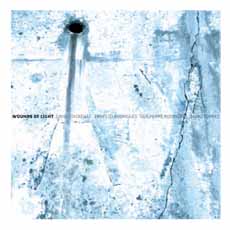
Ernesto Rodrigues
David Stackenäs
Guilherme Rodrigues
Nuno Torres
cs178
Light?
There’s never been any lightness to the Rodrigueses’ playing.
Physically, there’s often a
lot of pressure applied with the bow; intellectually, their music is consistently
ripe with thought
and pregnant with meaning – aerial perhaps, but light, never.
Yes, I know, it’s not lightness this title is about. It’s
illumination, brilliance, luminance –
all words aptly describing (in reverse order) the father-son duo’s
music, this particular quartet
session, and the result of experiencing both.
Thought, focus, the resonance of each musician’s soul with his instrument
and his
colleagues: all these factors are enlightening, casting – yes –
a light on the music at hand. But
they don’t explain everything. How could they? How could one truly
explain the magic of
genuine collective improvisation? The act of performing as one yet as
separate personalities? The feat of achieving cohesion without resorting
to predictability? The incredible level of
“telepathy/synergy/complementarity” between Ernesto, Guilherme,
David, and Nuno? The
uncanny way this quartet lays out and articulates sounds so that the listener
may feel like a
participant, someone as accountable for the success of the recording as
the musicians involved? In following the Rodrigueses’ adventures
through the catalogue of the Creative Sources label, I have often tried
to explain all this and know that I am doomed to fail, always.
Light, therefore. There shall be light as you listen to this CD. But the
music itself is far
from sunny. It has its dark corners, its shadows, its pitch-black Lovecraftian
recesses – moreso
than most of the recordings involving the Rodrigueses, and especially
in the second piece, where a sense of impending doom (un)resolves in a
very strange way. An ironic use of the word “light,then? Perhaps,
although in this case, that which is absent (light) could hurt your eyes
if it wereused maliciously. Speaking of maliciousness, David Stackenäs
– the X factor in this aligment – is maliciously playing the
agent provocateur part; his acoustic guitar work, gritty, grating, highly
experimental and unique, sits wonderfully well between the tensed-up textures
of the
Rodrigueses’ stringwork and the quiet, inner-reaching tones from
Nuno Torres’ saxophone.
But does it hurt, this wound? Revelations always hurt – at least
a bit – our preconceived ideas, if nothing else. And that might
happen to you, especially around the nine-minute mark in
the third piece, when Stackenäs chooses the path of most resistance,
triggering the most unruly
moment of the album. That’s when a lightbulb might come on in the
heads of the most blasé of
listeners: “Oh my, they’re having fun too!”If you’re
all stuck up about non-idiomatic improvisation, that kind of enlightenment
could leave a mark!
François Couture
blog.monsieurdelire.com